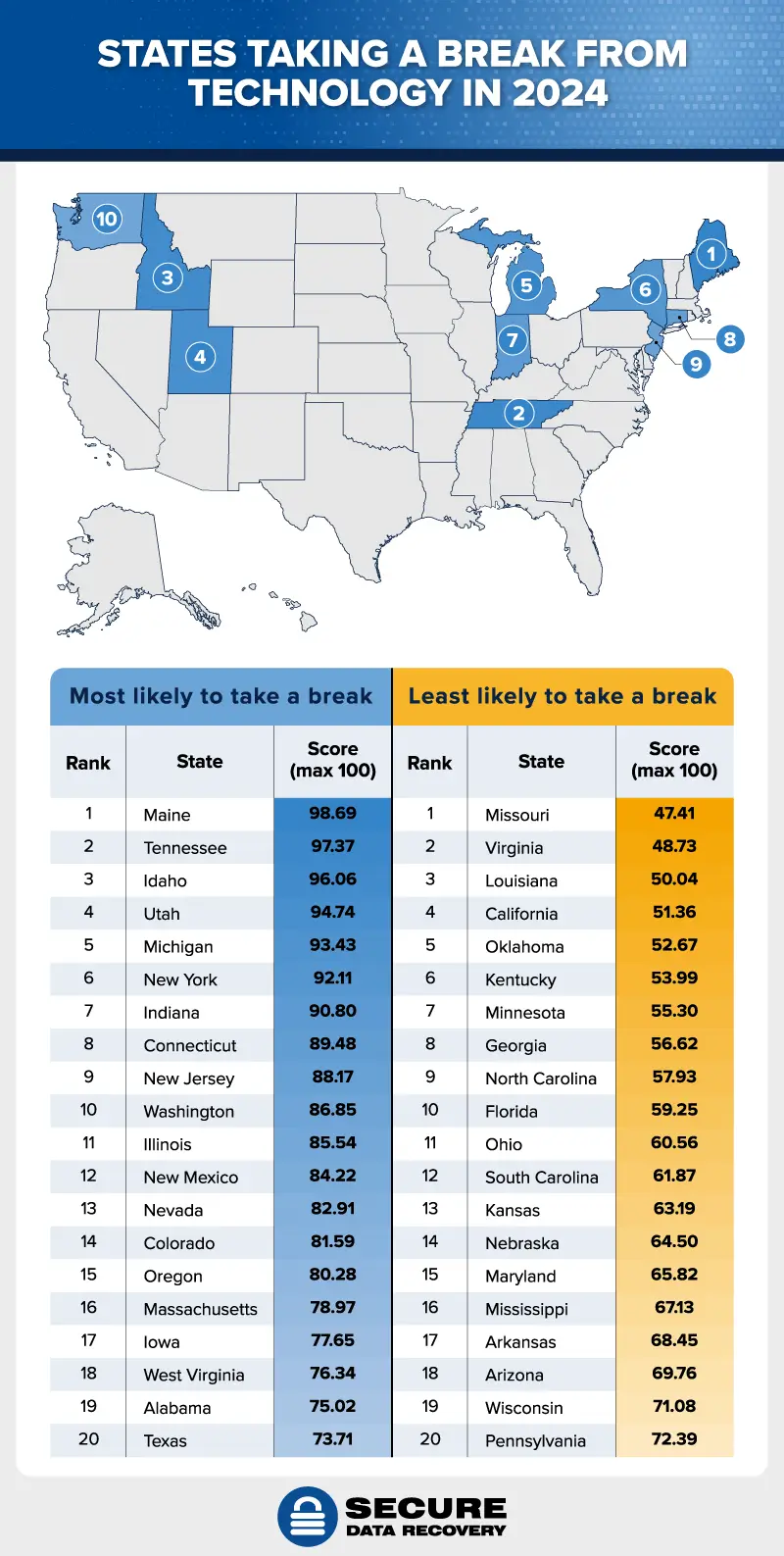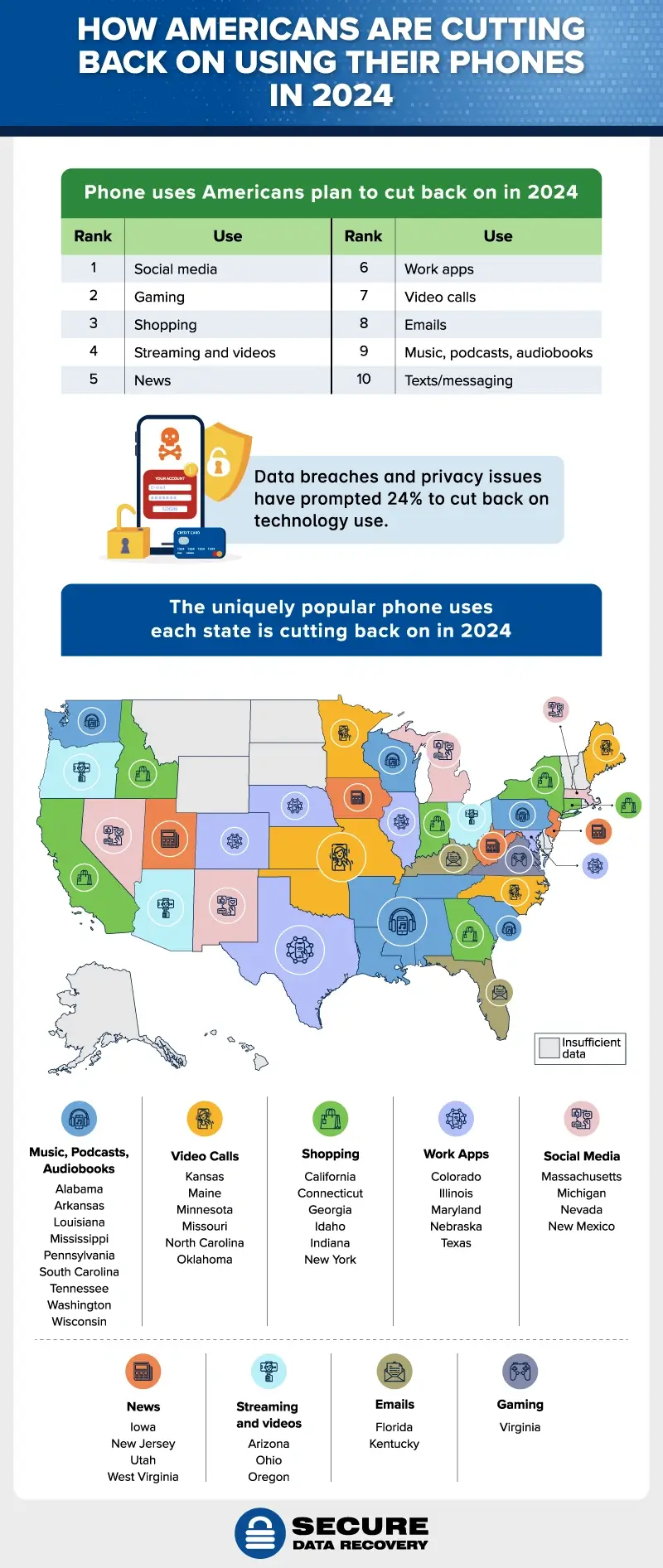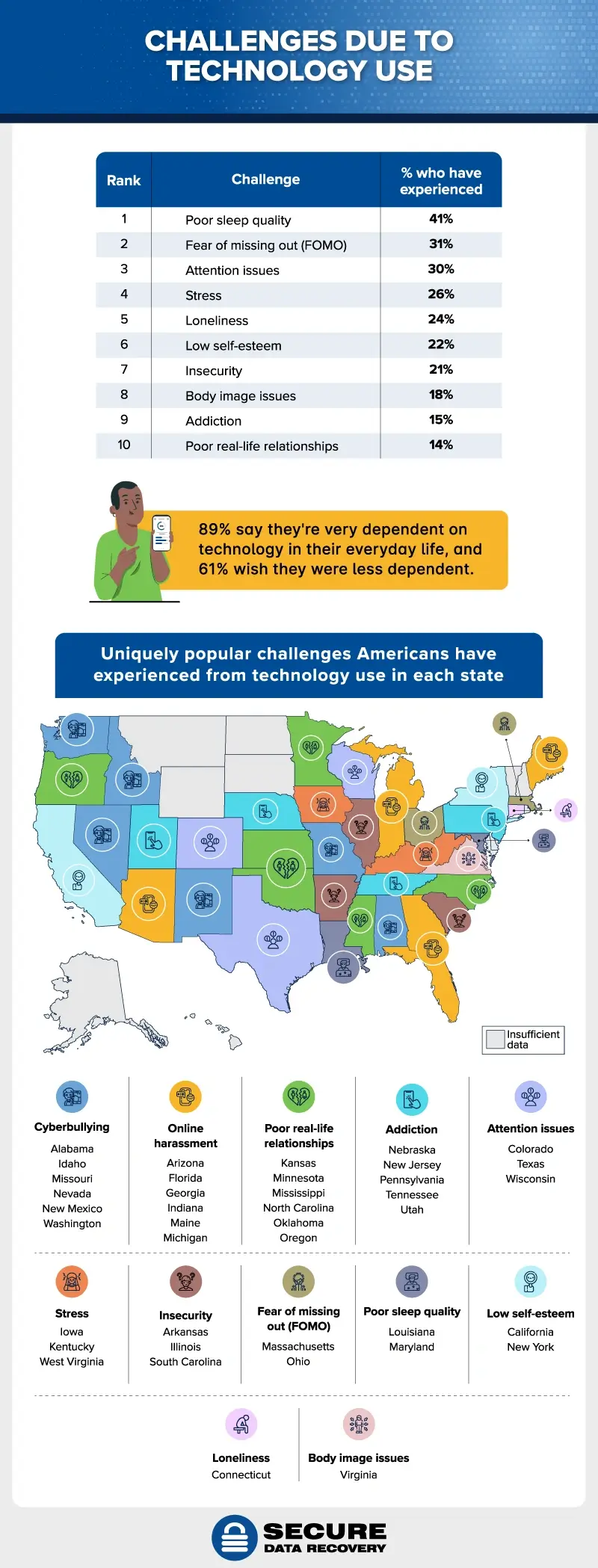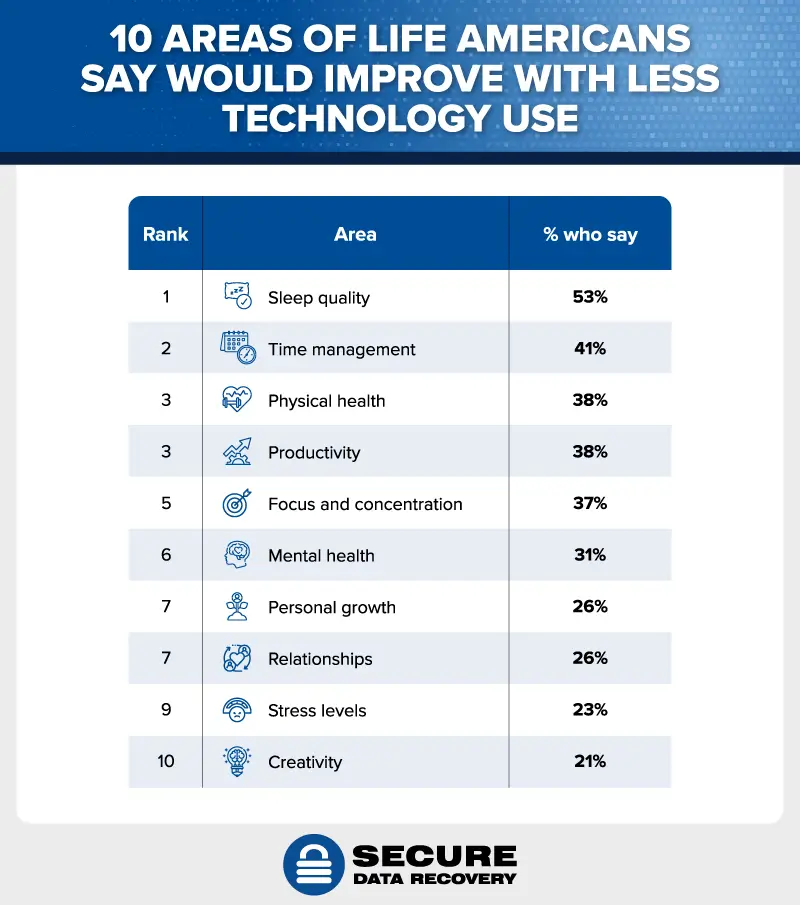In a world that thrives on constant connectivity and digital innovation, the idea of unplugging from tech may seem outrageous. From the moment we wake up to the moment we go to sleep, many of us interact with technology, whether out of necessity or leisure.
However, as we step into 2024, some Americans are choosing to disconnect in order to reconnect with life beyond their devices. Whether it’s because they encounter too much negativity or they think it’s doing more harm than good, some Americans are looking to ditch their digitized lives — even if it’s just for a moment.
As providers of data recovery services, we know just how dependent Americans are on technology and their data, so we were curious to find out where people were adding digital detox to their New Year to-do list most. Read on to find out where people are decreasing their technology use and the reasons they’re planning to make a change.
Key Findings
- Maine, Tennessee, and Idaho are the top states where people are taking a break from technology in 2024.
- Technology exposes 69% to more negativity in the world than they'd like.
- Over half, 64%, mainly use technology for entertainment.
- Within 5 minutes or less of waking up, 61% use technology, and 1 in 3 use it within a minute or less.
- Technology is more harmful than helpful to human connection, according to 41%.
States Where People Are Taking a Break From Technology in 2024
When you think about your daily activities, it can be hard to come across some that require no technology use at all. Whether it's to set a timer for your food that's cooking or asking your smart home device what the weather will be like that day, chances are you interact with technology very frequently.
In fact, digital devices have even shaped the leisure activities Americans engage in; 64% say they mainly use technology for entertainment. While technology undoubtedly offers numerous benefits, its use can sometimes feel like a double-edged sword. Nearly 7 in 10 (69%) say its use exposes them to more negativity in the world than they'd like.
To find out where Americans are slowing down their digital use most, we surveyed Americans about their plans to use technology in 2024. We then assigned points to the answer choices, giving more points to individuals who claimed they plan to use technology less.
Our respondents revealed that the states where people are planning to take a break from technology most in 2024 are Maine, Tennessee, and Idaho. With all three states being home to some of the most beautifully serene landscapes in the country, it can be a motivating place to unplug. Surprisingly, states where technology and innovation play a significant role in the economy also made the list, such as New York, Washington, Massachusetts, and Texas.

Technology Uses Americans Are Cutting Back On
Taking a break from technology isn’t the easiest thing to do, especially in a world where, for many, technology is the first and last thing they interact with before going to bed and waking up. Our respondents revealed that 61% use technology within 5 minutes or less of waking up, and 1 in 3 use it within a minute or less.
Cutting out phone time will require a true effort, but many Americans are up for the challenge. In 2024, the top things Americans plan to use their phone less for are social media, gaming, and shopping. While all three things are often done leisurely, Americans will have extra time for other non-digital activities.
We also found the “uniquely popular” things people are cutting back on regarding their phones in each state, meaning what use was the highest for that state when compared to our entire sample pool. The uniquely popular phone use most states are cutting back on is listening to music, podcasts, and audiobooks. This shows us that people in many states are hoping to be more in tune with the conversations around them.
Many things can motivate Americans to cut back on using their digital devices, especially something as serious as their privacy. Our survey revealed that data breaches and privacy issues have prompted 24% to cut back on technology use. When we hear about personal information getting leaked or stolen, it can make us concerned about our own data.

Challenges Americans Have Experienced Due to Technology Use
When data breaches and privacy aren’t the concern, there are other negative challenges Americans face through technology use. Poor sleep quality is the top challenge Americans experience from technology use. The list of challenges continues with fear of missing out (FOMO) and attention issues.
We also determined the uniquely popular challenges Americans have experienced from technology use in each state. The most common ones across states were poor real-life relationships, online harassment, and cyberbullying. With all three being something that could seriously impact someone’s happiness, it’s no wonder some are hoping to cut back.
Although challenges arise, it can be hard to unplug. Nearly 9 in 10 say they're very dependent on technology in their everyday life, and 61% wish they were less dependent.

How Decreased Technology Use Can Benefit Americans
If the negative aspects of technology use don’t motivate you to put your devices down, consider the benefits. For starters, 53% of respondents believe that their sleep quality would improve with less technology use.
Embracing a reduction in technology use can also offer significant benefits to human connection. After all, 41% think technology is more harmful than helpful to human connection.
We’ve all been there — we think, just five more minutes, and then I’ll stop using my device, but when you check back, it’s been more than 30. Truth is, It’s easy to get carried away on your devices, so much so that 56% are shocked by how much time they spend on their phone. The sweet spot is finding a balance between the convenience of technology and reaching for genuine connections outside of it.

Protecting Your Digital Life
By recognizing the potential pitfalls of excessive technology use and the need for a more balanced digital lifestyle, you may decide to join the band of Americans looking to improve their quality of life by reducing time on their devices. Whether you plan to use technology a lot or a little this year, it’s crucial to ensure your valuable information remains secure and accessible.
Whether it’s memories stored in photos, essential documents, or vital business information, Secure Data Recovery’s services contribute to the peace of mind that comes with knowing that data can be recovered if needed.
With a 96% success rate, we’re confident in our ability to restore your data through hard drive recovery or other data recovery services. In this year of tech-conscious consumer choices, the cross between technology use and reliable data recovery solutions proves to be a vital aspect of promoting a healthier and more secure digital environment.
Methodology
From December 21 to December 27, 2023, we surveyed 2,019 Americans about how often they plan to use technology in 2024 and how technology impacts their lives. To determine scores, we asked respondents questions such as “On a scale of 1 to 10, with 10 being increased technology use, how often do you plan to use technology in 2024 compared to 2023?” and “On a scale of 1 to 5, with 5 being increased use, how often do you plan to use technology for the following reasons in 2024 compared to 2023?” We then assigned points to each question’s answer choices, giving points to individuals who claimed they plan to use technology less. Respondents ranged in age from 18 to 76 years old, and were 50% female, 48% male, and 2% nonbinary.






